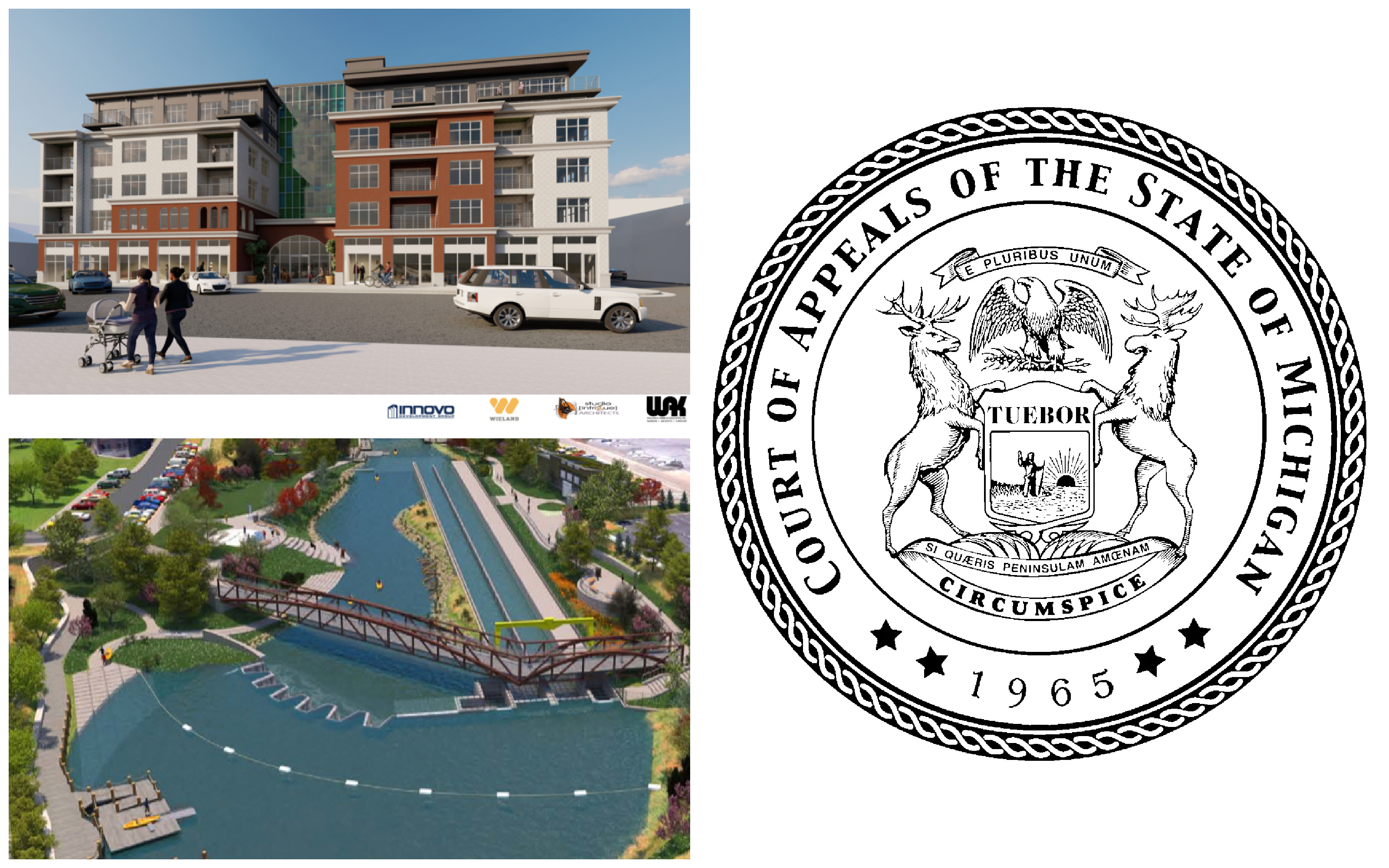
What’s Next For Building Height, FishPass In Traverse City?
By Beth Milligan | Oct. 31, 2022
Two recent Michigan Court of Appeals rulings will have major impacts on the City of Traverse City, handing the city partial or full victories in cases involving the way building height is measured and the planned construction of FishPass at the Union Street Dam. As a 42-day clock ticks down for plaintiffs to file appeals, The Ticker looks at next steps and what the rulings could mean for projects in the city.
Building Height
A Michigan Court of Appeals ruling October 13 overturned a 2021 ruling by Judge Thomas Power stating all parts of a building must be under 60 feet or else go to a public vote under the city charter in Traverse City.
Community group Save Our Downtown sued over a Hall Street mixed-use apartment building planned by development group Innovo, arguing that parts of the city-approved project were over 60 feet and thus subject to a public vote. The city and Innovo argued that building height has always been measured from the grade to the roof deck – excluding parapets, steeples, clock towers, and other mechanical and architectural features – and that city policy adopted after the charter was amended specified some building features could be over 60 feet and not trigger a vote. Judge Thomas Power sided with Save Our Downtown, requiring either all building features to be under 60 feet or else go to a vote. That ruling impacted both Innovo’s Hall Street development and Peninsula Place, a planned project by developer Tom McIntyre on State Street that also has design features over 60 feet.
The Michigan Court of Appeals overturned Power’s ruling, saying the city charter amendment "does not expressly address how to measure the height of a building.” If Save Our Downtown wants to change the city's zoning ordinance regarding how building height is measured, the court said, the group must follow the proper legal process in Michigan for amending zoning rules. The ruling means the city can continue to measure height as it has traditionally, excluding some building features. The court agreed with Save Our Downtown, however, that even under the city’s definition of building height, the Innovo project exceeds 60 feet by roughly two feet and would need to either modify its design or go to a vote.
Innovo representatives are ready to do both. Prior to the higher court ruling, Innovo had already requested to place its project before voters on the November 8 ballot. If voters approve the project next week, the building can proceed as designed – with a green roof and insulation slightly over 60 feet. If voters reject the ballot proposal, Innovo will modify its design to shave off two feet and resubmit the project to the city to proceed. Other major building components will remain the same either way, representatives say: a 97-unit apartment complex with an on-site parking garage and rooftop amenities like a lounge and bocce courts for tenants.
“Roughly 70 percent of the units will be studios and one-bedrooms targeted at workforce obtainable housing, which we gauge at 80 percent of the area median income (AMI),” says Innovo Principal Trae Allman. He notes that mix is similar to Innovo’s other nearby project, Breakwater on Garland Street. “The other 30 percent will be larger two and three-bedroom units.” Innovo Principal Brian Mullally says that the higher court ruling means “we can now construct the building with rooftop amenities, which is great because tenants will enjoy views of the water. Coming out of the pandemic, rooftop space was a priority for us. It was one of the big reasons to participate in the legal matter, to make sure we had the ability to do that kind of development.” Innovo plans to break ground in early spring – either with the current or modified design – with a planned 18–24-month construction period to follow.
The developers say public misinformation has swirled since the Hall Street project was placed on the November ballot. Neither of Innovo’s projects – Breakwater and Hall Street – will allow short-term rentals, a use that is specifically prohibited in leases despite rumors to the contrary, Mullally says. He says the recent conversion of Trailside45 from rental apartments to condos has fostered cynicism about other workforce housing projects, but says Innovo is committed to being long-term owners of rental apartments.
“It’s not what we do at all, it’s not our model,” he says of development flips. “It’s frustrating for us to be painted with that brush. We are in a housing crisis, and we need apartments for our teachers, firefighters, and nurses. More and more apartments are being built in outlying communities, but Traverse City needs to do a better job of creating opportunities downtown.” Mullally calls next week’s ballot proposal a “referendum on housing,” saying he’s been taken aback by the lack of support among some community leaders for more housing density. “There’s a lot of NIMBYism in this community as it relates to housing for workers, and we think that’s unfortunate,” he says. “We see it as a moral issue.”
City Attorney Lauren Trible-Laucht says the Michigan Court of Appeals ruling has positive implications for other projects, including Peninsula Place – which filed a federal lawsuit over the height interpretation but could now proceed with its design under the reinstated city standards for measuring height – as well as other developments that come forward with architectural or mechanical features over 60 feet. There is a 42-day window in effect following the Michigan Court of Appeals ruling for Save Our Downtown to appeal to the Michigan Supreme Court; the city will remain in a holding pattern under Power’s former ruling until that appeal window has passed, Trible-Laucht says. Save Our Downtown attorney Jay Zelenock says his clients “have made no decisions about any possible next steps” regarding an appeal.
FishPass
The Michigan Court of Appeals also recently ruled on another significant city case, overturning a Thirteenth Circuit Court decision regarding the construction of an experimental fish passage system called FishPass at the Union Street Dam in downtown Traverse City. The court determined a public vote is not needed for FishPass construction to proceed, rejecting a 2021 decision from Judge Thomas Power. Power had ruled in favor of Rick Buckhalter – a resident suing the city – agreeing with Buckhalter’s argument that installing a research facility at the park was a fundamental change in property use and would require a public vote to proceed under the city charter. The Michigan Court of Appeals rejected that argument, ruling that "the property continues to be used for valid park purposes under the project” and “there will be no meaningful deviation in the usage of the property as a park such that a vote of the electorate is necessary to execute the project.” Because the city prevailed, it’s entitled to recover costs; Trible-Laucht says the city is having “internal discussions” about whether to pursue that option.
Because an injunction has been in place since early 2021 prohibiting any work on FishPass, Trible-Laucht says next steps will likely include extensive conversations with project partners – including the Great Lakes Fishery Commission, the U.S. Army Corps of Engineers, and contractor Spence Brothers Construction – to update project plans, including costs, contracts, funding sources, and timelines. The construction contract was previously awarded to Spence Brothers for $19.3 million, but rising material costs and labor shortages have driven up expenses industry-wide since then. “I think there will be quite a bit of work that has to go on behind the scenes to understand how the agreement might need to be updated,” Trible-Laucht says. She says staff will bring an update to city commissioners at some point on how FishPass will move forward, but “it might take us awhile to get prepared with all of that information.”
As with the Innovo case, the plaintiff in the FishPass lawsuit – Buckhalter – has 42 days to appeal to the Michigan Supreme Court. Zelenock, who also represents Buckhalter, says his client is “disappointed with the court’s decision and is considering his options... he has not decided what his next steps will be.” In both cases, even if the plaintiffs do appeal, it's up to the Michigan Supreme Court to decide whether to hear a case (the court is not compelled to do so). If the Michigan Supreme Court declines to hear a case, the Michigan Court of Appeals ruling stands.
Comment






